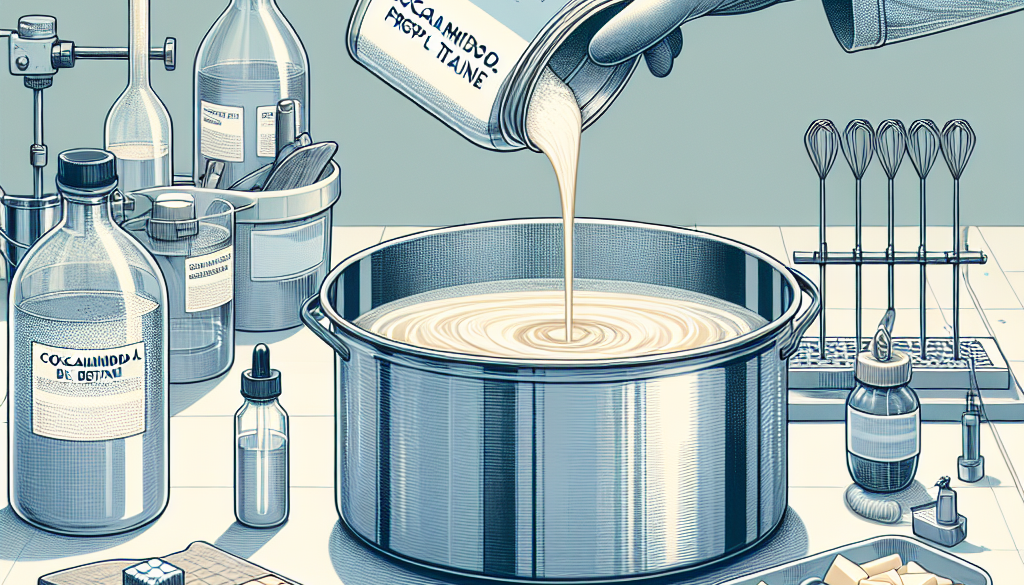Can I Add Cocamidopropyl Betaine to CP Soap?
-
Table of Contents
Can I Add Cocamidopropyl Betaine to CP Soap?
When it comes to soap making, particularly cold process (CP) soap, the choice of ingredients can significantly influence the characteristics of the final product. Cocamidopropyl betaine (CAPB) is a synthetic surfactant derived from coconut oil and dimethylaminopropylamine. It’s commonly used in various personal care products such as shampoos, conditioners, and body washes due to its excellent foaming properties and mild nature. However, the question arises: can you add cocamidopropyl betaine to CP soap? This article explores the feasibility, benefits, and considerations of incorporating CAPB into cold process soap formulations.
Understanding Cocamidopropyl Betaine
Cocamidopropyl betaine serves as a secondary surfactant in many cleansing products. It is appreciated for its ability to boost foam, reduce irritation potential of primary surfactants, and provide a gentle cleansing experience. Here are some key properties of CAPB:
- Mildness: CAPB is known for its mildness, making it suitable for sensitive skin formulations.
- Foaming Capability: It enhances the foaming action, which can be desirable in soap products.
- Thickening Effect: When used in conjunction with other surfactants, it can help increase the viscosity of the product.
- Compatibility: CAPB is compatible with most other surfactants and ingredients used in soap making.
Can You Add CAPB to CP Soap?
Integrating cocamidopropyl betaine into cold process soap recipes is not typical, but it is possible. The primary consideration is the saponification process that occurs in CP soap making, where oils and lye interact to form soap. Adding surfactants like CAPB to this mix requires careful consideration of the timing and proportions to maintain the integrity of the soap and achieve the desired benefits.
Benefits of Adding CAPB to CP Soap
Incorporating CAPB into CP soap can offer several advantages:
- Enhanced Foaming: CAPB can increase the lather quality of the soap, making it more luxurious and appealing.
- Improved Skin Feel: Due to its conditioning properties, CAPB can make the soap more moisturizing and less drying to the skin.
- Mildness: Adding CAPB can reduce the overall irritancy of the soap, which is beneficial for sensitive skin types.
Considerations and Challenges
While there are benefits, there are also specific challenges to address when adding CAPB to CP soap:
- Formulation Stability: Ensuring that the CAPB does not react adversely with other ingredients during saponification is crucial.
- Measurement and Timing: Accurate measurement and appropriate timing of addition are vital to prevent the CAPB from interfering with the soap setting process.
- Cost and Accessibility: CAPB may increase the cost of soap production and may not be readily available to all soap makers.
How to Incorporate CAPB into CP Soap
For those interested in experimenting with CAPB in CP soap, here are some guidelines:
- Proportion: Start with a small amount, typically around 1-3% of the total weight of the soap batch.
- Point of Addition: Add CAPB at light trace to ensure it mixes well without accelerating trace too much.
- Testing: Always test your new formulation in a small batch to observe the effects before scaling up.
Conclusion
Adding cocamidopropyl betaine to CP soap can enhance its foaming properties and skin-feel, making it an intriguing option for soap makers looking to innovate their product offerings. However, it requires careful formulation and testing to ensure the stability and effectiveness of the soap. As with any modification to traditional soap recipes, it’s essential to understand the characteristics and interactions of all ingredients involved.
Explore ETprotein’s High-Quality Protein Products
If you are in the market for top-tier protein and nutritional ingredients, consider ETprotein. They offer a wide range of organic and allergen-free protein products perfect for various applications in the food, beverage, and health industries. Their commitment to quality and customer satisfaction makes them a preferred choice for businesses worldwide.
ETprotein is Betaine Factory Manufacturer and Supplier in China, Check further information by visiting the Betaine Product Page
Request Quotation and Samples of Betaine from ETprotein
About ETprotein
ETprotein, a reputable protein and elite nutrition ingredients Betaine Chinese factory manufacturer and supplier, is renowned for producing, stocking, exporting, and delivering the highest quality organic bulk vegan proteins and elite nutritional ingredients Betaine. They include Organic rice protein, clear rice protein, pea protein, clear pea protein, watermelon seed protein, pumpkin seed protein, sunflower seed protein, mung bean protein, peanut protein. Their offerings, characterized by a neutral taste, non-GMO, allergen-free attributes, cater to a diverse range of industries. They serve nutraceutical, pharmaceutical, cosmeceutical, veterinary, as well as food and beverage finished product distributors, traders, and manufacturers across Europe, USA, Canada, Australia, Thailand, Japan, Korea, Brazil, and Chile, among others.
ETprotein specialization includes exporting and delivering tailor-made protein powder and finished nutritional supplements. Their extensive product range covers sectors like Food and Beverage, Sports Nutrition, Weight Management, Dietary Supplements, Health and Wellness Products, and Infant Formula, ensuring comprehensive solutions to meet all your protein needs.
As a trusted company by leading global food and beverage brands and Fortune 500 companies, ETprotein reinforces China’s reputation in the global arena. For more information or to sample their products, please contact them and email sales(at)ETprotein.com today.














